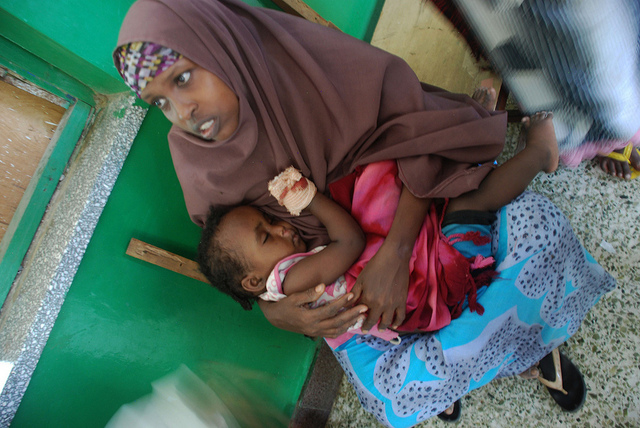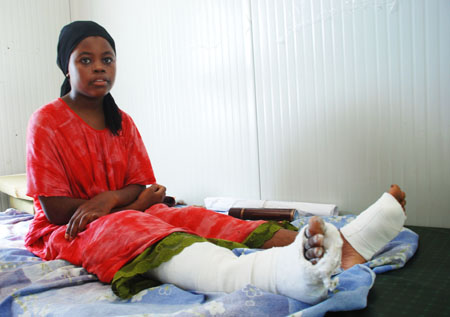
Editor’s Note: Since the early 1900s countries around the world have celebrated International Women’s Day as a time to recognize the role of women in society and mobilize against injustices specifically impacting half of the world’s population. At Enough, rather than confining our commemoration to just one day—March 8—we’re giving a special focus to women all this week, to highlight how the conflicts we’re working to end affect women and girls, and to recognize the work of heroes advocating on their behalf.
In the fifth and final post of our International Women’s Week coverage, Enough’s Kenya based researcher Laura Heaton shares testimonies from children in Mogadishu about the impact of the decades-long conflict.
The theme of International Women’s Day 2012 is focused on the experience of the girl child: “Connecting Girls, Inspiring Futures.” Certainly the women we have featured through out special blog series this week have made a real impact on girl survivors of some of Africa’s deadliest conflicts.
In reflecting on what to include in this final post on Somalia, I thought about the children themselves, about the life-changing experiences that led them to become the beneficiaries of the good work of people like Busseina, the Darfuri teacher, or Denise, the Congolese lawyer.
In a detailed new report on Somalia, Human Rights Watch documented the systematic abuses of children by all armed actors, including forced recruitment of child soldiers, attacks on schools, and forced marriage. The report is a sobering reminder of the lasting impact of the conflict on a generation who has known only war.
“If world leaders …want to address Somalia’s future, it’s crucial for them to protect this shattered generation of children from further horror and invest in their education and security,” said Zama Coursen-Neff, deputy children’s rights director at Human Rights Watch.
I couldn’t agree more. But I’m also I was reminded of a handful of stories I heard during recent trips to Somalia that are not characterized so much by warlords and gun-totting extremists. They’re testimonies that wouldn’t necessarily make their way into reports because they’re not about systematic abuses or the depth of corruption that perpetuates the war. But the stories are part of the daily life in Somalia today, where everyday experiences like walking home from school or playing at home with a sibling can be fraught with threats.
Of course it’s wonderful to hear about the extraordinary actions and achievements of women who have beat all odds to rise above challenging circumstances and even found ways to give back to their communities. But it is also important to recognize the bravery of people for whom day-to-day existence can be a feat, simply because they are caught up in the chaos around them.

Khadija, 14 | Growing up in a neighborhood of central Mogadishu, Khadija has seen more than her share of fighting. But lately there have been fewer clashes in the streets, and the nights are quieter, not so often punctuated by the sounds of gunfire.
Even though al-Shabaab left Mogadishu last August, they’ve managed to continue terrorizing people through suicide bombers and roadside bombs. People say that the explosions are meant to kill the African Union peacekeepers or government officials, but Khadija and more than a dozen other people bore the brunt of the explosion one November afternoon.
When we met, Khadija was sitting up in her bed at a hospital run by doctors from the A.U. peacekeeping mission, her leg in a cast from hip to ankle. We talked first about school. She missed her friends and her classes, especially English. Twenty days had passed since the attack, which occurred as Khadija was walking home from school. She was with a group of friends when the sudden blast knocked her down and left her ears ringing, she said. Khadija didn’t remember well what happened next, but even in that moment she knew many people died. “I felt I was somehow lucky,” she said.
Khadija was first taken to a field hospital for injured peacekeepers, where doctor’s treated her fractured knee and the gaping wounds on her leg and foot from the shrapnel of the bomb. Recently, she was transferred to a quieter hospital ward. She said she doesn’t know when she will get to go home, but she hopes soon. Like any active teenager, Khadija just seems eager to move on with life, seeing the cast on her leg as little more than a hindrance that’s keeping her away from school and friends.
Outside the room, I asked the Ugandan nurse Ruth about Khadija’s condition. Will she have lingering physical ailments as a result of the injury? Khadija is always in good spirits, Ruth said. And she’s young – she will heal completely.
Zainab, 2 | Little Zainab was sleeping on her mother’s chest in the hallway of a crowded pediatrics ward at Mogadishu’s Benadir hospital. Most of the young patients were emaciated, some with IVs in their arms or heads. Zainab looked healthy except for her tiny hand, which was wrapped in bloody gauze. Speaking in a hushed voice to not wake her daughter, who was sleeping soundly despite the bustle around her, Zainab’s mother described what happened.
Zainab’s father isn’t a soldier or a member of a local militia, but for the protection of their family he owns a pistol. “It’s very normal here,” said her mother. They have two children, Zainab and a son, who is seven, so Zainab’s father typically hides the gun out of reach. But as he rushed out of the house that morning, he accidentally left the pistol out. Zainab’s mother said several minutes later her phone rang. It was her husband. He was frantic, calling to say that he forgot to put the gun away. “I was on the phone when I heard the shot,” Zainab’s mother said. Her son had fired the gun and shot his little sister. “I was frightened, but what could I do [to my son]? This life with so many guns is what he knows,” she said. “He was just playing.”
Zainab’s mother said the bullet passed straight through the little girl’s hand, which is good because she probably won’t need surgery. They were waiting to know if any bones were broken. Finally, after a traumatic several hours, Zainab had fallen asleep.
Photo: Two-year-old Zainab at Benadir hospital (Enough / Laura Heaton)
Read the other posts in this International Women's Week series.
Check out Enough Project's coverage of International Women's Day 2012 on Storify

